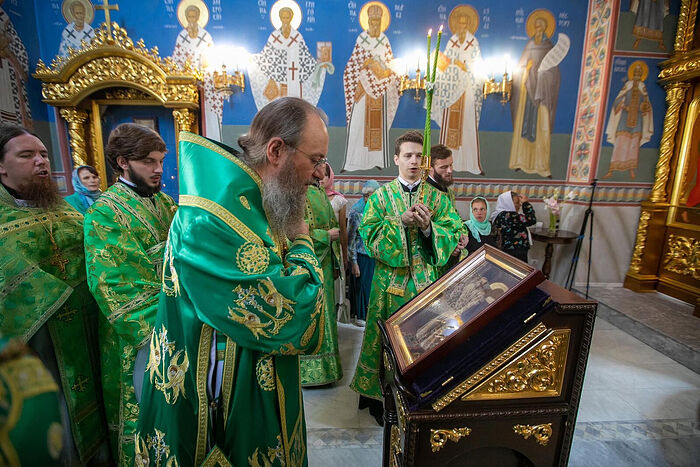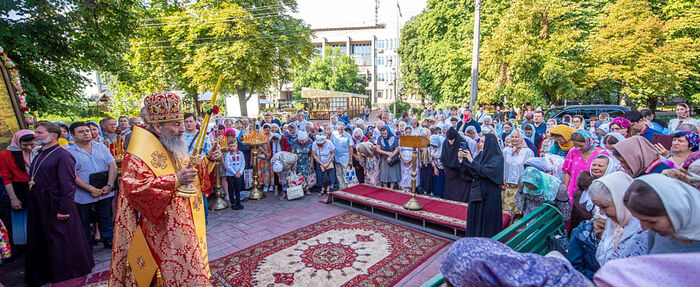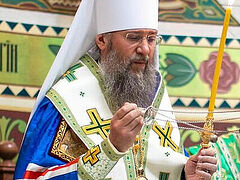Kiev, August 4, 2023
As of mid-July, Old Calendar Christmas is no longer a state holiday in Ukraine. Instead, the state will only recognize December 25, which just became a state holiday in 2017.
For the past six years, both December 25 and January 7 were both recognized as state holidays, but following the decisions earlier this year from the Ukrainian Catholic Uniates and the state-created schismatic “Orthodox Church of Ukraine” to switch to the New Calendar for ecclesiastical purposes, the state did the same.
However, despite the added pressure that comes with such a decision, the canonical Ukrainian Orthodox Church has no intention of changing its millennium-old tradition.
 Met. Anthony, Chancellor of the UOC. Photo: pravlife.org
Met. Anthony, Chancellor of the UOC. Photo: pravlife.org
His Eminence Metropolitan Anthony of Boryspil and Brovary, Chancellor of the canonical UOC, recently spoke about the sordid history of the New Calendar, including its introduction by Patriarch Meletios (Metaxakis) and explained why the UOC is not considering switching to the New Calendar.
Of the many demands on the Church from the “progressive public,” one of the loudest in recent times is the transition to the New Calendar.
The supporters of such a transition generally argue as follows: The current Church calendar is not part of dogma; the New Calendar is more accurate from an astronomical point of view; if you adopt the New Calendar, there will be no differences with the civil calendar.
Yes, the Julian Calendar, on which the Church calendar is based, is a tradition, and not part of dogmatic teaching. And the New Gregorian Calendar (or the Revised Julian Calendar), originally adopted in the Catholic world, is indeed astronomically more accurate. However, in the Church, any innovations or changes in tradition are usually made slowly and deliberately. And most importantly, it is always important to clearly define the purpose of these innovations.
Let’s remember exactly how the New Calendar was introduced in those Orthodox Churches that adhere to it. There had been discussions about calendar reform in the Church for quite some time. But in practice, it was actively introduced in the 1920s by the infamous Patriarch of Constantinople Meletios IV (Metaxakis). Patriarch Meletios managed to be the Archbishop of Athens, the Patriarch of Constantinople, and the Patriarch of Alexandria during his life. He is known primarily for his intrigues, forgeries, the seizure of other canonical territories, the support of the Renovationists, and many other very unseemly deeds. And his desire to transfer the Orthodox to the New Calendar, almost identical to the Western Gregorian Calendar, was motivated not so much by the desire to give the Church a more accurate chronology, as by political calculations for union with the Anglican Church, which would have been facilitated by other concessions, such as, for example, the possibility of marriage for priests and deacons after ordination and the permissibility of remarriage for clerics.
Many of Patriarch Meletios’ political projects never came to fruition, and he often had to leave the chairs he headed with scandals. But his main brainchild, the New Calendar, has taken root in the Orthodox Churches, although also not without problems: The aggressive introduction of the new chronology caused disorganization and even “Old Calendarist” schisms.
However, there are completely pragmatic arguments against the New Julian Calendar as well. Even those Churches that have switched to the New Julian Calendar continue to calculate the time of Pascha and the movable feasts dependent on it according to the Julian Calendar. And this creates certain liturgical problems: For example, when Pascha is late, the Apostles’ Fast may completely disappear from the liturgical year. Attempts to create a new Paschalion have failed so far.
Supporters of the New Calendar often point to the fact that the difference between the new and old chronology is 13 days and will only increase over time until the moment comes when Christmas according to the Julian Calendar will have to be celebrated in the summer. In fact, the difference between calendars is growing, but this hypothetical move of Christmas to the summer won’t happen for millennia, and during this time the Church will clearly be able to cope with all calendar problems, if it pleases the Lord to preserve our sinful world by that time.
This is more a political than an ecclesiastical problem now. And those who aggressively instigate this topic are thinking about our parishioners least of all, especially now, when they literally want to ban our Church, which means to destroy it. Taking care of the faithful is our first duty. Let us ask ourselves a simple question: Does Church life according to the Julian Calendar currently prevent us from leading people to God? Clearly not. Will the transition to the New Calendar bring us closer to the Lord? The answer is also obvious.
At the same time, the negative side of such an ill-considered transition is very clear. It’s enough to recall all the consequences of radical Church reforms to slow down any zeal not according to reason. To tempt believers and cause another schism in the Church now, to put it mildly, is irresponsible.
The secular authorities have the right, based on their priorities, to introduce or cancel holidays that they consider to be state holidays. Our right is to celebrate Church feasts at our own time, established by long-standing tradition. And no one can take away this right from us.
Follow OrthoChristian on Twitter, Vkontakte, Telegram, WhatsApp, MeWe, and Gab!




